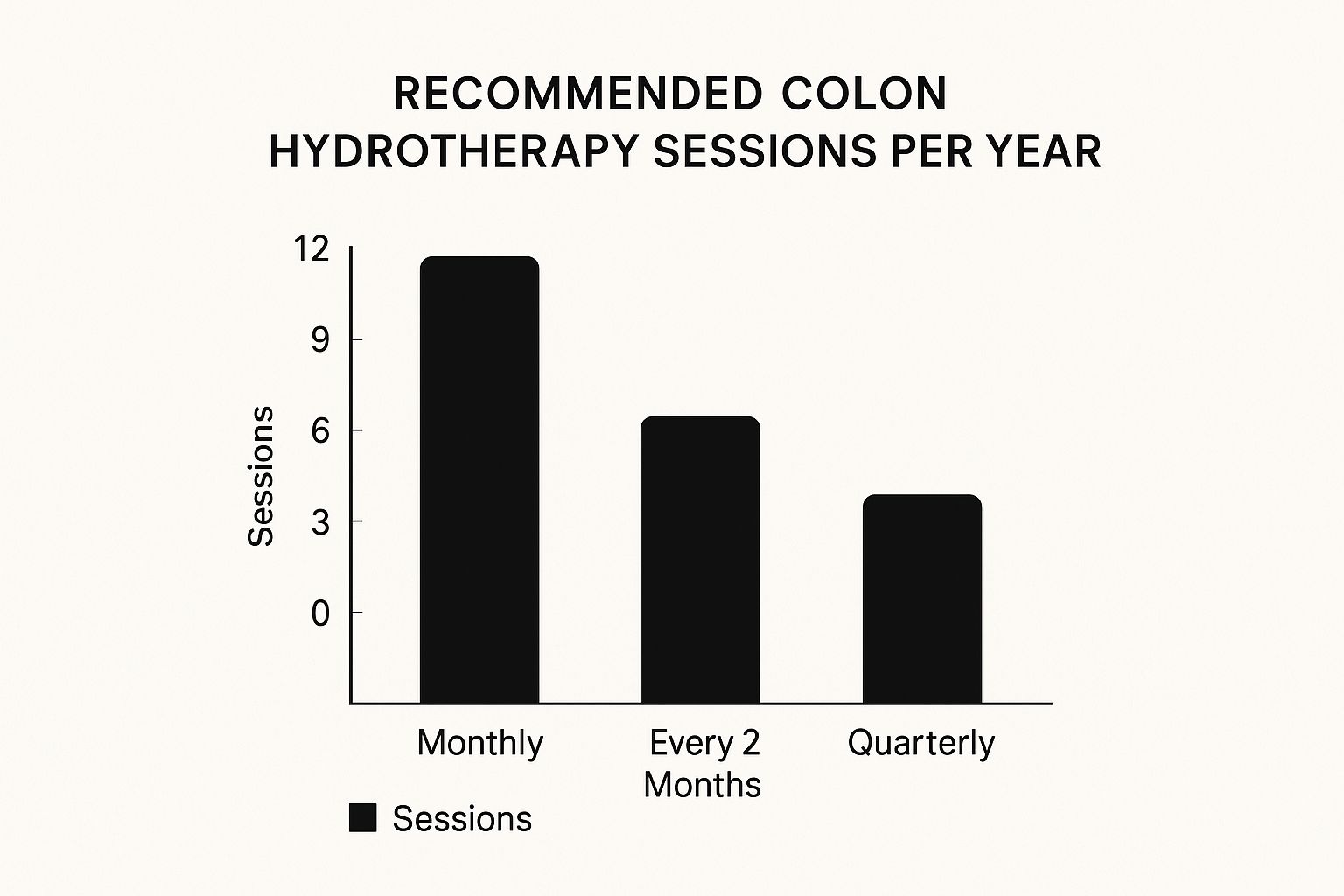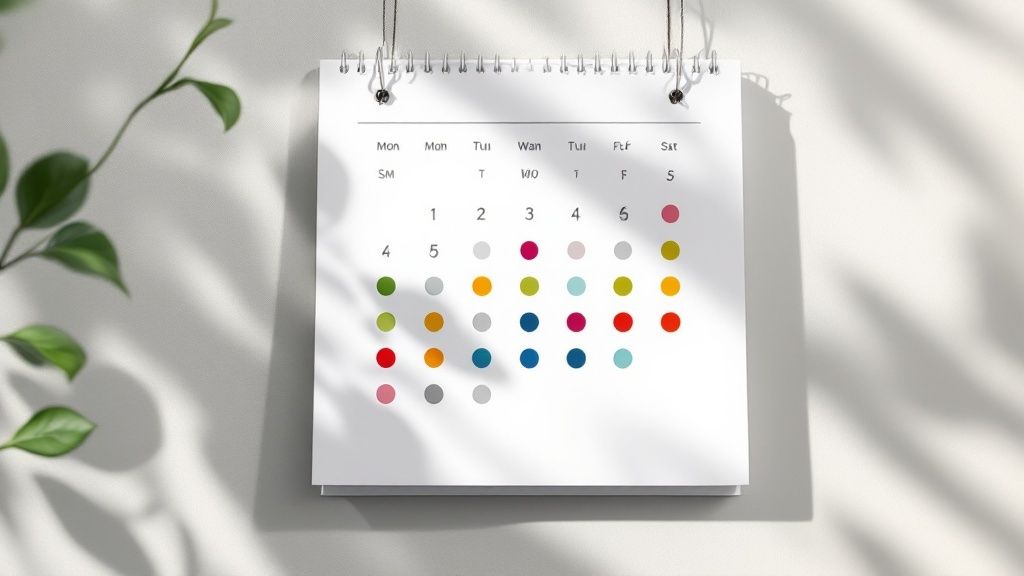One of the first questions I always get is, "So, how often should I be doing this?" The truth is, there's no magic number. Think of it like a personalized fitness plan—what works for a marathon runner is completely different from what a weekend jogger needs. Your ideal colon hydrotherapy schedule depends entirely on your …
One of the first questions I always get is, "So, how often should I be doing this?" The truth is, there's no magic number. Think of it like a personalized fitness plan—what works for a marathon runner is completely different from what a weekend jogger needs. Your ideal colon hydrotherapy schedule depends entirely on your unique health goals, your body's current state, and the guidance of your therapist.
Finding Your Ideal Colon Hydrotherapy Schedule
Figuring out the right frequency starts with a simple question: What are you hoping to achieve?
Are you trying to get a handle on a specific issue like chronic constipation? Or is your focus more on general wellness and feeling your best? Your answer is the key that unlocks your personalized schedule.
Most people start with a short series of sessions clustered together, then transition to a less frequent maintenance plan. This "front-loading" approach gives your system a gentle reset before settling into a sustainable, long-term rhythm. The goal is always to support your body's natural elimination process, not replace it.
Common Scheduling Scenarios
Let's break down a few common situations. While every plan should be tailored to you, these examples give you a good idea of what to expect:
- For an Initial Cleanse: Many people begin with 2-3 sessions over a 7-10 day period. This can really help kickstart the process.
- For Managing Constipation: To help get things moving regularly again, you might start with an initial series and then move to a monthly maintenance session.
- For General Wellness: If you're simply looking to maintain good gut health, sessions can be spaced much further apart. Think once a month, every other month, or even just seasonally (four times a year).
Here’s a simple table to illustrate how your goals might shape your schedule.
Example Colon Hydrotherapy Frequencies
This table outlines common scenarios and generally suggested frequencies. Always consult a professional for a personalized plan.
| Your Primary Goal | Typical Starting Series | Ongoing Maintenance Plan |
|---|---|---|
| Jumpstart a detox or cleanse | 2-3 sessions within 1-2 weeks | 1 session every 3-6 months |
| Address chronic constipation | 3 sessions within 10-14 days | 1 session every 4-6 weeks |
| Support general wellness | 1-2 sessions | 1 session seasonally (4x a year) |
As you can see, the focus often shifts from an initial "reset" to a more spaced-out maintenance schedule for long-term support.

Consistency is more important than sheer frequency for long-term benefits. Getting the most out of each visit is also crucial, which is why proper preparation matters so much. You can learn more about what to do before a colonic hydrotherapy session to ensure you have the best possible experience.
So, What Exactly Happens During Colon Hydrotherapy?
Before we jump into how often you should schedule a session, it’s helpful to understand what’s actually going on. Let's ditch the confusing medical jargon. Think of it simply as a gentle, internal shower for your large intestine. The main goal is to hydrate and soften old, compacted waste, which makes it much easier for your body to flush it out on its own.
This isn't about aggressively "scrubbing" your insides clean. It’s more about supporting what your body is already designed to do. The process can help retrain the colon's muscles, which can get a bit lazy over time. It's almost like physical therapy for your bowel—a gentle nudge to get it working at its peak again.
And that's precisely why the timing of your sessions is so critical.
Finding the Right Rhythm for Your Body
Getting the schedule right means you’re working with your body's natural rhythm, not against it. If you space your treatments too far apart, you might not build enough momentum to see real, lasting change, especially if you’re dealing with a long-term issue like constipation. Your colon could just slip back into its old habits between appointments.
On the other hand, scheduling sessions too close together isn’t the answer either. Your body needs time to rest, recover, and readjust. The sweet spot is finding that perfect balance—the one that delivers the best, most sustainable results without putting your system on overdrive. A great treatment plan supports your body's pace, it doesn't try to force it.
The goal of a spa colon cleansing treatment is to gently bring back your body’s natural elimination rhythm. A smart schedule ensures each session builds on the last, creating positive momentum for your long-term digestive health.
Key Factors That Influence Your Colonic Schedule
Figuring out how often you should get a colonic isn't about following a rigid formula. It's more like putting together a personalized puzzle, where your unique health profile, goals, and even your daily habits are the key pieces. Your practitioner will use these clues to map out a schedule that's both safe and genuinely effective for you.
Think of it this way: your colon is just one part of a complex, interconnected system. Everything from your diet and stress levels to how much water you drink and any underlying health conditions affects how it functions. That's why a schedule designed for someone doing a seasonal cleanse will look completely different from one for a person managing a chronic digestive issue.
Your Specific Health Conditions
Your current state of health is the single biggest factor. If you're dealing with something like chronic constipation or Irritable Bowel Syndrome (IBS), your needs will be quite different from someone who's just looking for general preventative care. For more persistent problems, a therapist might suggest an initial series of sessions scheduled closely together. The idea is to help reset the colon's muscle function and get it back into a more regular rhythm.
For instance, one study with 175 patients suffering from chronic constipation showed that 100% of them were able to pass stool during a high-volume colonic irrigation. This really underscores how powerful it can be for specific digestive challenges. You can read the full research about these findings to see how it’s applied for managing refractory chronic constipation.
Your personal health journey dictates the starting point. The goal is to create a schedule that supports your body's immediate needs before transitioning to a sustainable, long-term maintenance plan.
Wellness Goals and Lifestyle Choices
Beyond any specific conditions, your bigger wellness goals and daily habits play a huge role in the equation. Are you looking for a gentle detoxification after a period of overindulgence, or are you focused on maintaining your gut health for the long haul?

- Detoxification Goals: If a "reset" is what you're after, you might schedule a few sessions over a couple of weeks, maybe just once or twice a year.
- General Wellness: For simply maintaining good digestive function, a quarterly or seasonal session is often all it takes to keep things running smoothly.
- Lifestyle Impact: Someone with a diet low in fiber and high in processed foods will likely need more support than a person who eats plenty of whole foods and stays well-hydrated.
Ultimately, the best path forward comes from an open conversation with your therapist. They'll take all these factors into account—your health history, lifestyle, and personal goals—to recommend a colonic schedule that’s just right for you. This collaborative approach ensures you get the exact level of support your body needs.
What Does a Colonic Schedule Look Like in Practice?

Alright, let's move from theory to reality. What does a colon hydrotherapy schedule actually look like? The honest answer is: it depends entirely on what you're trying to achieve. However, most people follow a two-phase approach—an initial "starting series" to reset the system, followed by a long-term "maintenance plan."
Think of it like getting a car's engine cleaned out. You might do a more intensive flush at first to clear out the gunk, then switch to regular oil changes to keep it running smoothly.
For someone just starting out with the goal of a general detox, a series of two or three sessions within a week or two is a common starting point. This initial push helps hydrate, soften, and clear out old, impacted waste. It’s a short, focused effort designed to get things moving and give your body a clean slate.
For Chronic Digestive Issues
If you're dealing with something more persistent, like chronic constipation or a sluggish digestive system, the initial phase might be a bit more involved. The objective here isn't just to cleanse, but to help retrain the colon's muscles and restore a more regular, natural rhythm.
There's some compelling research to back this up, especially for conditions like IBS. One study focusing on IBS with constipation found that a structured series of colonics made a real difference. Participants' average weekly bowel movements more than doubled, jumping from 1.68 to 3.78 times per week. You can dig into the IBS treatment findings yourself, but it highlights how a concentrated series of treatments can create tangible, lasting improvements.
The "Starting Series vs. Maintenance" model is really the heart of smart scheduling. You tackle the immediate issue head-on, then shift gears to provide consistent, long-term support for your digestive well-being.
For General Wellness and Long-Term Upkeep
Once you've achieved your initial goals, the game changes. Now, it's all about maintenance. For most people focused on general health, this means finding a sustainable, less frequent schedule that supports the body's natural processes without overdoing it.
A typical maintenance plan might look like one of these options:
- Once a Month: A great rhythm for ongoing digestive support and keeping things regular.
- Once a Quarter: Many people like to schedule a session with the change of seasons as a periodic reset.
- As-Needed: You might schedule a session when you feel "off"—perhaps after a period of travel, high stress, or after indulging in foods you don't normally eat.
This kind of flexibility allows you to give your body support right when it needs it most. The best first step is always to talk with a qualified therapist. If you're ready to start that conversation and create a personalized plan, finding a professional offering a colon cleanse near me is a great place to begin.
The Risks of Too Frequent Colon Hydrotherapy

When it comes to colon hydrotherapy, it's easy to think more is better, but that's a common misconception. Think of it like over-watering a houseplant—even with something essential like water, too much can do more harm than good. Getting the frequency right is all about understanding the potential downsides of an overly aggressive schedule.
Your digestive system is a finely tuned machine, maintaining a precise balance of fluids, electrolytes like potassium and sodium, and a whole universe of good bacteria. A balanced, thoughtful approach is always going to be more effective than just scheduling as many sessions as possible.
Maintaining Your Body’s Natural Balance
When you schedule sessions too close together, you risk upsetting that delicate internal environment. This can lead to a few specific problems that we need to be mindful of.
Here are the main concerns with overdoing colon hydrotherapy:
- Electrolyte Imbalance: Constantly flushing the colon can wash away essential minerals that are vital for everything from nerve function to proper hydration.
- Dehydration: It sounds counterintuitive since the procedure uses water, but it's possible to end up with a net loss of fluids if your sessions are too frequent and not managed correctly.
- Gut Microbiome Disruption: Your colon is teeming with trillions of beneficial bacteria. While the goal is to clear out unwanted waste, overdoing it can strip away the good guys, too.
This is why health organizations like the Mayo Clinic urge caution against frequent sessions unless there's a specific medical reason. You can read more about consumer health perspectives on colon cleansing to get a fuller picture. A smart approach always includes professional guidance and considers your diet and lifestyle.
The goal is to support your body's natural functions, not override them. A safe, moderate schedule designed with a professional ensures you receive benefits without compromising your internal ecosystem.
Your Colonic Frequency Questions, Answered
It's completely normal to have a lot of questions as you figure out the right path for your wellness journey. When it comes to colon hydrotherapy, one of the biggest unknowns is frequency. Let's clear up some of the most common questions so you can feel confident about your schedule.
Can I Get a Colonic Every Week?
For most people, the answer is no—at least not for the long haul. While a therapist might recommend a few weekly sessions right at the start to tackle a specific, acute issue like severe constipation, that's a short-term fix, not a permanent plan.
The whole point is to encourage your body's natural processes, not to create a dependency. A healthy, sustainable schedule usually settles into monthly or even quarterly sessions for maintenance. This approach avoids potential downsides like electrolyte imbalance and lets your body do its job.
A smart colon hydrotherapy plan isn't set in stone. It should be flexible, adapting to your life's changes—whether that's a new diet, a stressful period, or a travel schedule. Regular check-ins with your therapist are crucial.
How Many Sessions Before I Feel a Difference?
This is truly different for everyone. Many clients walk out of their very first session feeling lighter, less bloated, and with a noticeable boost in energy.
However, if you're dealing with more chronic issues, it might take a series of 3 to 6 sessions spaced out over a few weeks to really see lasting changes in your bowel habits and overall comfort. Your therapist will help you set realistic expectations based on your personal health picture.
Should My Schedule Change Over Time?
Yes, it absolutely should. It's very common to start with a more condensed series of sessions to "reset" your system or get constipation under control.
Once you’ve reached that initial goal, the next step is to transition to a less frequent maintenance phase. This ensures your schedule continues to support you effectively without overdoing it.
Ready to create a personalized plan that supports your unique wellness goals? The certified therapists at Healing Waters Wellness Center are here to guide you. Book your consultation today to start your journey toward better digestive health.






